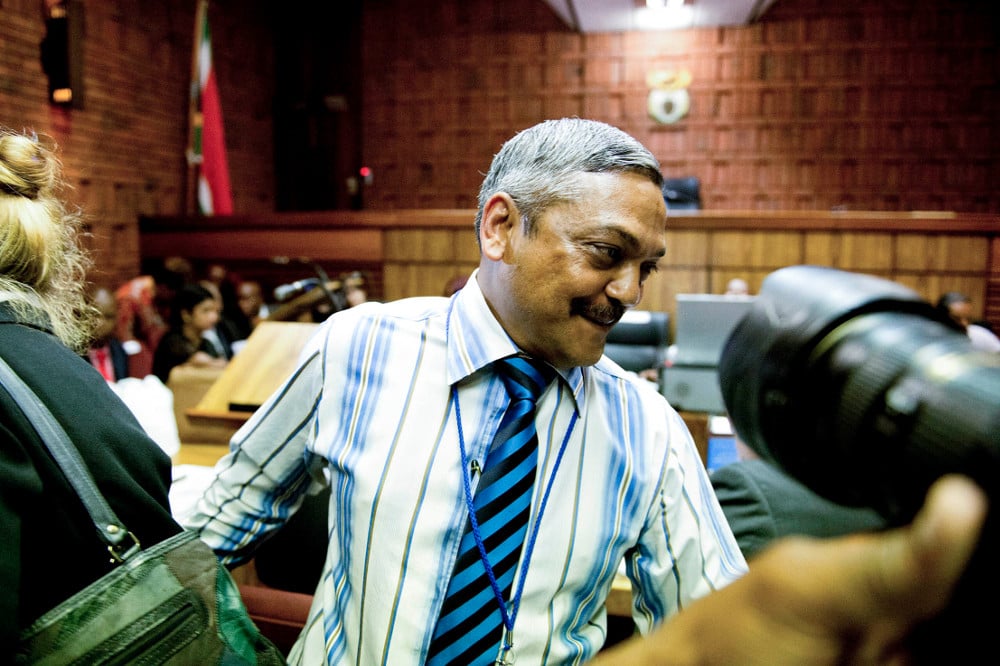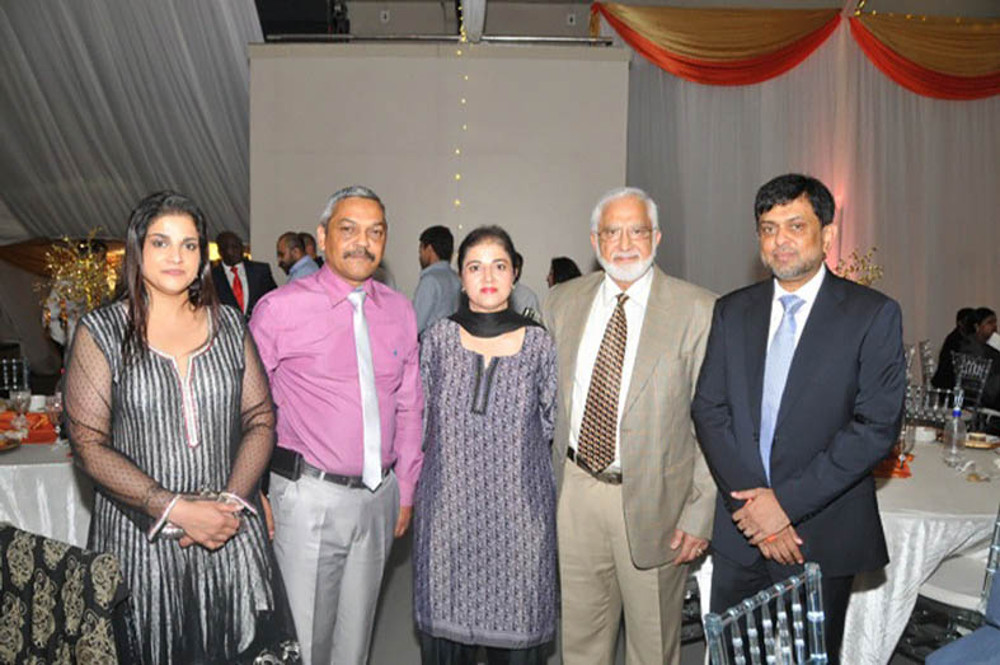Paul O'Sullivan says Riah Phiyega and Vinesh Moonoo protecting South Africa is like 'leaving the mice to guard the cheese'.
As the political manipulation of the criminal justice system reaches a constitutional crisis point, private investigator Paul O’Sullivan is once again at the centre of fractures shaking the police, the Hawks and the South African Revenue Service (Sars).
O’Sullivan, credited with bringing down former police commissioner Jackie Selebi, is now taking on Selebi’s latest successor, Riah Phiyega.
On January 10, he wrote privately to her, levelling several allegations against her and the divisional commissioner for the detective service, Lieutenant General Vinesh Moonoo.
In his letter, seen by amaBhungane, he accused her of protecting Moonoo, who appears to be Phiyega’s choice to handle sensitive investigations, including the criminal investigation of the R250-million upgrade to President Jacob Zuma’s Nkandla homestead.
A struggle between Moonoo and the Hawks commander, Anwa Dramat, to control the Nkandla docket is reported to be a key factor behind the allegedly unconstitutional suspension of the Hawks boss.
In his letter, O’Sullivan charged: “You have created a climate where people like Moonoo have busied themselves with turf wars against colleagues in the Hawks, for no other reason than he himself has questionable conduct to explain.
“You and Moonoo protecting South Africa is like leaving the mice to guard the cheese.”
The South African Police Service (SAPS) spokesperson, Solomon Makgale, said: “If Paul O’Sullivan has any information about criminal activities involving General Moonoo, he can go to the nearest police station and provide a sworn statement so the matter can be investigated.
“The fact of the matter is that Paul circulates correspondence with the national commissioner to various people within the SAPS, as well as members of the media.”
In a seeming rerun of the Selebi saga, in which O’Sullivan publicly committed himself to toppling the former police boss, the controversial investigator warned: “You both need to be removed from office in the best interests of South Africa. I now hereby commit myself to that end result, by all lawful means at my disposal.”
But five days later, on January 15, he allegedly received a tip-off from a contact in Laudium, to the effect that Moonoo had boasted in the community that O’Sullivan would soon be arrested and “taught a lesson and [be] destroyed in the media”.
O’Sullivan left the country the same day and his lawyers are preparing to launch an urgent interdict to restrain the SAPS from arresting him.
Responding to the claim, Makgale said: “General Moonoo does not reside in Laudium and denies that he ever made those remarks. We cannot provide anyone with a guarantee that he or she will not be arrested. If you have committed a crime, you will be arrested. If you have committed no crime then you have nothing to fear.”
Allegations in his letter to Phiyega put O’Sullivan at the heart of several flashpoints in the SAPS, Sars and the Hawks.
O’Sullivan has also recently made common cause with Gauteng Hawks boss Shadrack Sibiya, a long-time collaborator in his investigations, including one into the Czech fugitive from justice, Radovan Krejcir.
He has backed Sibiya’s bid to fight his suspension over allegations that he and the Hawks were party to the illegal rendition of Zimbabwean criminal suspects, some of whom were later allegedly killed by the Zimbabwean police.

Paul O’Sullivan accuses Lieutenant General Vinesh Moonoo of being associated with several allegedly suspect businesspeople. (Liza van Deventer, Gallo)
Police Minister Nathi Nhleko used these allegations as a reason to suspend Dramat, despite the fact that a report by the Independent Police Investigative Directorate is said to have cleared both Sibiya and Dramat.
Nhleko appears to have defied a Constitutional Court ruling, which apparently only permits Dramat’s suspension after the initiation of a parliamentary inquiry.
The suspension is being challenged in the Pretoria high court by the Helen Suzman Foundation.
O’Sullivan accuses Moonoo of having a suspect relationship with three separate businesspeople, or their representatives, all of whom have been investigated by the Hawks, Sars or both.
His allegations have been denied by all those involved.
Case 1: The tobacco barons, the Hawks, Sars and the blonde bombshell
In his letter to Phiyega, O’Sullivan attached a photograph of Moonoo posing at a social function with Yusuf Kajee, the chief executive of Amalgamated Tobacco Manufacturing (ATM), whom he accuses of being notorious as the target of investigations by the Hawks and Sars.
“Despite sending the attached photograph to you months ago, there has never been any explanation as to what Moonoo was doing with … Kajee,” O’Sullivan said.
He claimed the photo was taken at the Emperors Palace Casino and suggests that Kajee has been able to call on Moonoo to protect him from a Hawks investigation led by a Brigadier Casper Jonker.
Kajee told amaBhungane that the meeting was innocent and took place at a function to celebrate the 153rd anniversary of the arrival of Indians in South Africa.
Investigations by amaBhungane suggest the truth is more complicated.
Newspaper reports make it clear that the function was hosted by Kajee on November?16 2013, at the premises of his new cigarette factory outside Pietermaritzburg, and that the guest list included Kajee’s former ATM codirector and President Jacob Zuma’s son, Edward Zuma. The KwaZulu-Natal finance MEC, Ina Cronjé, delivered the keynote address.

Vinesh Moonoo (second left) at a function in Pietermaritzburg with Yusuf Kajee (right).
AmaBhungane was told, but could not confirm, that Sars deputy commissioner Ivan Pillay personally warned Zuma that his son should be careful of his association with ATM.
Two days before the function, the Sars head of tax and customs enforcement, Johann van Loggerenberg, threw down the gauntlet to both the small tobacco players such as Kajee and the established producers such as British American Tobacco (BAT).
He accused the industry of smuggling and tax avoidance, as well as attempts to manipulate investigations or investigators.
On behalf of the small players, Van Loggerenberg addressed a letter to Belinda Walter, the chairperson of the Fair Trade Independent Tobacco Association.
Walter later had an affair with Van Loggerenberg during which she revealed that, while she was chairperson of the small producers’ association, she was spying on them for the State Security Agency and BAT – and by extension for the government and the industry’s joint illicit tobacco task team, headed by Jonker.
When Walter’s relationship with Van Loggerenberg soured, she complained that Sars had run illegal interceptions and launched a “rogue unit”. The claim led to the suspension of Van Loggerenberg and Pillay by the new Sars commissioner, Tom Moyane.
Case 2: The Bhanas
In his letter to Phiyega, O’Sullivan alleged that the controversial father-and-son team, Solly and Fazel Bhana, who gained notoriety for their involvement in the 2010 Aurora mining debacle, have an open line to Moonoo.
Aurora Empowerment Systems, whose directors included the president’s nephew, Khulubuse Zuma, and Nelson Mandela’s grandson, Zondwa Mandela, failed to secure funding in their bid to operate two gold mines, which belonged to the insolvent Pamodzi Group.
The Bhanas allegedly played a critical role in the debacle and are still being sued for money lost in the collapse.
They are set to appear in court in March alongside Zuma, Mandela and a KwaZulu-Natal businessperson, Thulani Ngubane, in a case brought by Pamodzi’s liquidators.
The liquidators want the five men to be held personally liable for almost R2-billion in damages to the assets of the two mines under Aurora’s control, including gold sales of about R120-million that were allegedly never accounted for.
They deny personal liability.
In his letter to Phiyega, O’Sullivan attached an affidavit that purports to show the Bhanas were also deeply involved in irregular gold sales from the Blyvooruitzicht gold mine in Carletonville.
The Bhanas, Ngubane and another businessperson, Bonginkosi Mthethwa, ran the mine after Blyvoor’s liquidators granted the men custody until they came up with money to buy the mine and its assets at the end of 2013.
The Blyvoor deal also collapsed, amid claims of asset stripping and sales of gold that were not accounted for.
In his letter, O’Sullivan told Phiyega: “As late as last night, after I approached a witness of the Bhanas’ conduct at Blyvooruizicht, and advised him I was working with the Hawks in cracking the case, he then called Solly Bhana, who blatantly advised of his connection with Moonoo.”
According to the recordings, which O’Sullivan shared with Phiyega, the witness told Solly Bhana of O’Sullivan’s investigation.
Bhana appears to say he would call Moonoo and later appears to advise the witness that “I spoke to General Moonoo … He says he’ll set it up in the morning and he’ll phone me straight away … So don’t worry.”
Solly Bhana’s lawyer, David Swartz, denied “in the strongest possible terms the frivolous and baseless allegations levelled against him by Mr O’Sullivan”.
“The statements made by Mr O’Sullivan, aside for being vexatious, are defamatory in the extreme and will be met with the appropriate action,” Swartz said on Bhana’s behalf.
According to O’Sullivan, an investigation involving Aurora and Blyvooruitzicht was initiated under the control of the Hawks, but has been taken over by Moonoo.
This could not be independently verified.
Case 3: Saleem Ebrahim and Edrees Hathurani
O’Sullivan’s allegations, essentially concerning meetings involving Moonoo, are mired in a welter of allegations and litigation between him and attorney Saleem Ebrahim and his client, Edrees Hathurani, who is associated through his family trust with the retail group Africa Cash ‘n Carry (AC&C).
Also in the mix is Sibiya. In March 2014, Hathurani brought a high court application to interdict Sibiya from pursuing an investigation against him.
He claimed Sibiya intervened to block charges he had laid against a former business partner. In turn, Sibiya alleged that, in relation to Hathurani’s rival, “members of the South African Police Service were used to arrest him in short succession for reward”.
AC&C and related companies are still under curatorship pending the resolution of a R1.2-billion tax dispute with Sars.
AC&C and Hathurani were also enmeshed in the events surrounding the receipt of boxes of cash by the former chief financial officer of the Financial Services Board, Dawood Seedat. Seedat resigned after it was revealed he had received about R3-million to provide consultancy services.
Seedat’s attorney, Darryl Ackerman, said at the time that his client had done “no tax work” for Hathurani, and said this week that his client had been cleared of any wrongdoing.
Ebrahim told amaBhungane: “Paul O’Sullivan and I are engaged in civil litigation, the subject matter of which underpins or references the bulk of your queries.”
He said there was an interim interdict prohibiting O’Sullivan from making the allegations contained in the letter sent to Phiyega.
It prohibits O’Sullivan from “insulting, defaming or demeaning” Hathurani or Ebrahim.
Ebrahim said: “I have never had any private meetings with General Moonoo. I have been introduced to him on one occasion.”
“I confirm that General Moonoo conducted an interview at the offices from which my firm practises. The interview was not with me or any member of my staff. I was not present during any stage of the interview.”
* Got a tip-off for us about this story? Click here.

The M&G Centre for Investigative Journalism (amaBhungane) produced this story. All views are ours. See www.amabhungane.co.za for our stories, activities and funding sources.